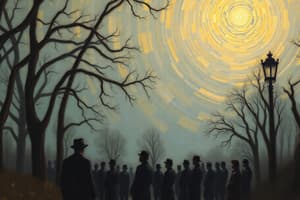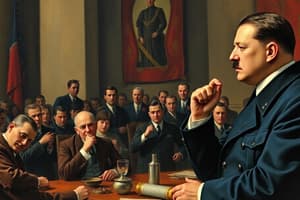Podcast
Questions and Answers
What economic event in 1929 significantly impacted Germany's economy?
What economic event in 1929 significantly impacted Germany's economy?
- The Gold Standard abandonment
- The oil crisis
- The stock market crash (correct)
- The Great Depression
What was a major consequence of the economic policies implemented by Chancellor Bruning?
What was a major consequence of the economic policies implemented by Chancellor Bruning?
- Increased government spending
- Raised taxes and reduced benefits (correct)
- Development of new financial regulations
- Expansion of social programs
How did the Great Depression affect voter behavior in Germany?
How did the Great Depression affect voter behavior in Germany?
- Increased support for moderate parties
- Increased votes for extreme parties (correct)
- Decreased voter turnout
- Rejection of all political parties
Which social group suffered the most during the Great Depression in Germany?
Which social group suffered the most during the Great Depression in Germany?
What was one of Hitler's promises to the German people during his rise to power?
What was one of Hitler's promises to the German people during his rise to power?
Which party gained significantly in the Reichstag elections due to the economic downturn?
Which party gained significantly in the Reichstag elections due to the economic downturn?
What was the unemployment rate in Germany by 1932?
What was the unemployment rate in Germany by 1932?
What was a direct link between the Great Depression and Nazi support?
What was a direct link between the Great Depression and Nazi support?
What organization was specifically created to reach the youth of Germany?
What organization was specifically created to reach the youth of Germany?
What was one of Hitler's main appeals to the German people during the depression?
What was one of Hitler's main appeals to the German people during the depression?
How did the SA contribute to the Nazi image?
How did the SA contribute to the Nazi image?
What was the purpose of the Nazi propaganda?
What was the purpose of the Nazi propaganda?
Which specific group did the Nazis promise 'Work and Bread'?
Which specific group did the Nazis promise 'Work and Bread'?
In the 1932 Presidential election, how many votes did Hitler receive?
In the 1932 Presidential election, how many votes did Hitler receive?
What was a key message promoted in Nazi propaganda?
What was a key message promoted in Nazi propaganda?
What strategy did Goebbels utilize to ensure the Nazi message was widespread?
What strategy did Goebbels utilize to ensure the Nazi message was widespread?
What economic condition in 1932 significantly contributed to the rise of the Nazi party?
What economic condition in 1932 significantly contributed to the rise of the Nazi party?
Which political party did the Nazis believe was linked to a conspiracy to destroy Germany?
Which political party did the Nazis believe was linked to a conspiracy to destroy Germany?
What was one significant factor that weakened the Weimar Republic?
What was one significant factor that weakened the Weimar Republic?
How did the Nazis use the SA to their advantage?
How did the Nazis use the SA to their advantage?
Which Republican figure had to frequently use Article 48 due to the instability of the government?
Which Republican figure had to frequently use Article 48 due to the instability of the government?
What approach did the Nazis take to gain further financial support from the elite?
What approach did the Nazis take to gain further financial support from the elite?
What major event did many Germans hold the Weimar Republic responsible for, contributing to its unpopularity?
What major event did many Germans hold the Weimar Republic responsible for, contributing to its unpopularity?
By July 1932, how many members of parliament did the Nazis have?
By July 1932, how many members of parliament did the Nazis have?
Flashcards are hidden until you start studying
Study Notes
The Depression and the Rise of the Nazi Party
- The Wall Street Crash of 1929 triggered a global depression that significantly impacted Germany.
- American banks stopped lending money to Germany and demanded repayment of existing loans, crippling German businesses.
- Industrial production in Germany plummeted by 40% by 1932 and wages dropped by 15%, leading to mass unemployment (3 million in 1930, 6 million in 1932).
- The German government, under Chancellor Bruning, failed to effectively address the crisis, choosing to raise taxes and cut unemployment benefits instead of printing more money. This exacerbated the suffering of the German people.
- The depression fueled public resentment towards the Weimar Republic, which was perceived as incompetent and unable to handle the crisis.
- The depression significantly contributed to the rise of the Nazi Party. As unemployment soared, so did Nazi votes, demonstrating a direct connection between the economic crisis and the Nazis' growing popularity.
- In 1930, the Nazis secured 107 seats in the Reichstag, rising to 196 in July 1932 and reaching 230 in November 1932, showcasing their rapid ascent.
The Fear of Communism
- The depression also led to a surge in support for the Communist Party (KPD) among the working class, who saw it as a potential solution to their economic woes.
- The Nazis, fiercely opposed to communism, portrayed it as a Jewish conspiracy aimed at destroying Germany. They promised to eradicate communism and presented themselves as the bulwark against its spread.
- The threat of a communist revolution scared the middle and upper classes, as well as businessmen, prompting them to support the Nazis as a counterforce.
- The Nazis, through their paramilitary wing, the SA (Sturmabteilung), engaged in violent street clashes with communists, disrupting their meetings and projecting an image of strength and decisiveness.
The Weaknesses of the Weimar Republic
- The Weimar Republic was plagued by instability and a lack of effective governance. Between 1919 and 1933, there were 20 different coalition governments, each struggling to form a consensus and implement concrete solutions.
- The constant political turmoil and the government's reliance on Article 48, which granted the president emergency powers, further undermined the Weimar Republic's credibility and reinforced perceptions of weakness.
- This instability created a vacuum of leadership that Hitler and the Nazis exploited, promising a strong and stable government in contrast to the perceived failures of the Weimar Republic.
The Organization of the Nazis and the Role of Hitler
- The Nazi Party was highly organized, establishing offices across Germany to recruit voters and securing financial backing from industrialists like Krupp and Bosch.
- The Nazi youth organization, Hitler Youth, targeted young people, indoctrinating them with Nazi ideology and securing future generations of supporters.
- The SA, the Nazi paramilitary wing, created a perception of power, discipline, and reliability. In a time of economic crisis, they presented a facade of order and strength.
- Hitler, an effective orator, held massive rallies across the country, delivering powerful speeches that resonated with the German people. His promises of economic recovery, national greatness, and restoration of order appealed to a wide range of individuals.
- In the 1932 presidential election, Hitler received over 11 million votes (30%), confirming his growing popularity and demonstrating the public's perception of him as a potential leader.
Nazi Propaganda and Promises
- The Nazis employed a sophisticated propaganda machine, utilizing radios, films, loudspeakers, posters, leaflets, and even controlling large swathes of the press (owning over 140 newspapers).
- Nazi propaganda targeted specific groups, including workers, farmers, businessmen, and the middle class.
- Key Nazi slogans like "One People, One Nation, One Leader" promoted unity and strong leadership, appealing to the desire for order and stability.
- They promised "bread and work" to the working class, economic recovery to the middle class, and protection from communism to big businesses.
- Through his promises and the manipulation of fear and uncertainty, Hitler emerged as the strong leader Germany seemed to crave.
Studying That Suits You
Use AI to generate personalized quizzes and flashcards to suit your learning preferences.




